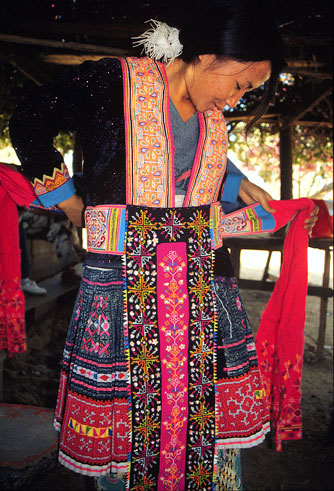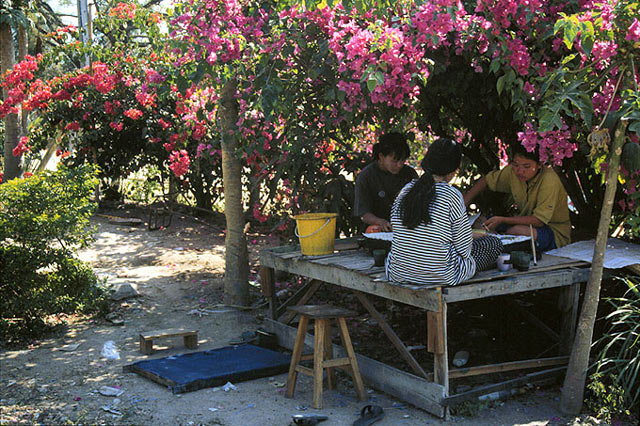
|
| > |
 |
|
| |

|
| |
| The village is named Pang Mai Dang, and was founded
twenty-five years ago as part of a project of the Thai King, Bhumibol Adulyadej,
to replace the villagers' revenue from opium growing, which had been outlawed.
The loss of that revenue for hill tribe people caused some families to sell
their daughters into prostitution in distant cities. Pang Mai Dang residents
accepted the King's help to pursue a better option: stable, consistent earnings
from sewing and silversmithing. |
|
Orathai not only makes more than her husband,
but virtually supports their family of six, soon to be seven. Orathai would
like some help earning money. Although in other parts of Asia, boys are
the preferred sex, she says, "I have only sons so far, so I would like my
new baby to be a girl. Only girls sew here." |
|
| |
 |

|
| |
| We drive with Ben Savasti, the director
of Women Against AIDS, down a winding dirt road along a thicket that obscures
squalid villages, to an outdoor restaurant at the edge of a placid lake
where we eat lunch and learn about his work. "Today, we have three kinds
of handicraft groups: AIDS patients, sex workers, and village women. Our
AIDS patients are mostly widows; their work allows them to be productive
and continue to earn. Sex workers in brothels make handicrafts in their
slow afternoon hours to pay off the debt they were saddled with |
|
when the brothel owner paid their parents.
Members of our ten village women's groups are skilled artisans; no one knows
which of these women are HIV positive; almost no testing is done." As we
drive through the verdant farmland to visit the women's groups, Ben advises
us, "Keep your eyes on the roofs. If they are not made of teak leaves, you
know there is only one way a family could afford better roofing: they sold
a daughter." |
|
|
|
©
Paola Gianturco and Toby Tuttle 2003-2009 |